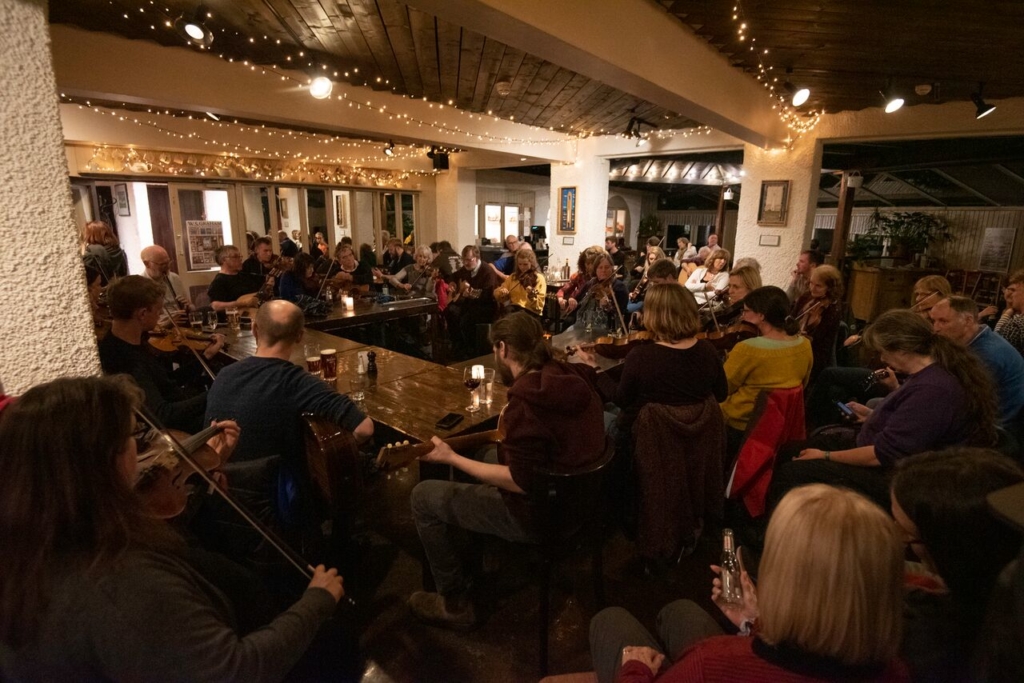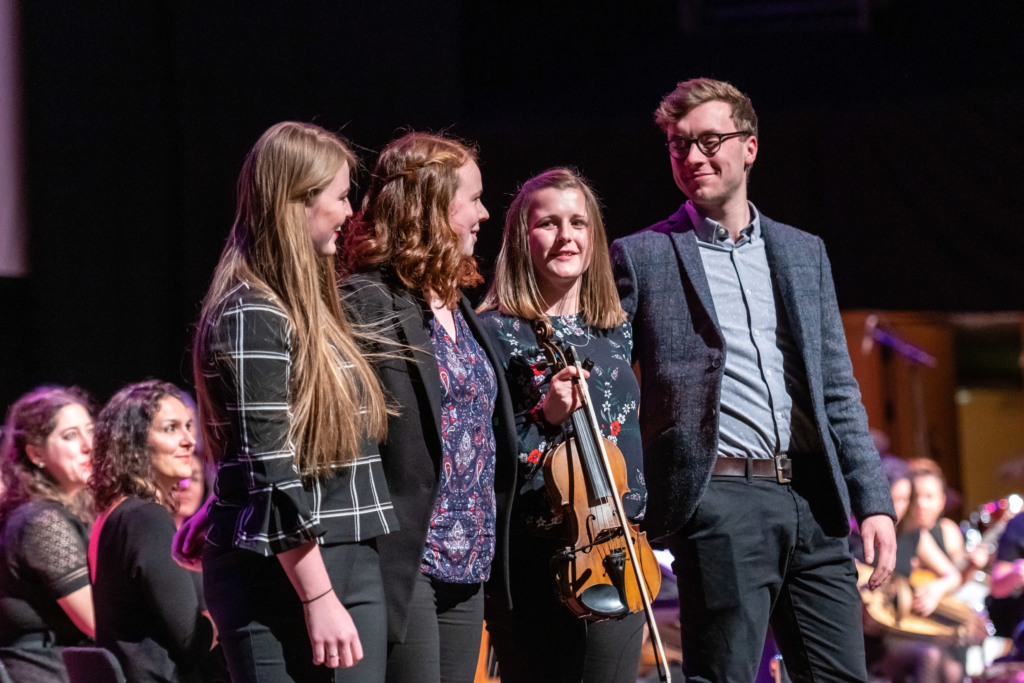The Art of Living Together
 This month I was at The Ceilidh Place in Ullapool for the annual adult Fèis Rois gathering, a three-day festival of tuition in traditional music, song, dance, Gaelic language and culture alongside fringe events, gigs and late-night cèilidh sessions in pubs all over the north west’s cultural capital. There is such a spirit of community here. For many, this is a chance not only to meet friends old and new, but to learn from the great tradition bearers – such as fiddler Aonghas Grant or Gaelic singers Rona Lightfoot and Cathy Ann MacPhee.
This month I was at The Ceilidh Place in Ullapool for the annual adult Fèis Rois gathering, a three-day festival of tuition in traditional music, song, dance, Gaelic language and culture alongside fringe events, gigs and late-night cèilidh sessions in pubs all over the north west’s cultural capital. There is such a spirit of community here. For many, this is a chance not only to meet friends old and new, but to learn from the great tradition bearers – such as fiddler Aonghas Grant or Gaelic singers Rona Lightfoot and Cathy Ann MacPhee.
This year the Fèis also welcomed a group of singers and musicians from Brittany, who threw a fest noz into the mix; two blind music students from the National Academy of Music in Bucharest and a young musician who is working hard to raise awareness of autism. Music has such an incredible power to connect, to bring people together.
The whole weekend was a life-affirming and hopeful reminder of what is important to hold on to in the face of it all. With the relentless daily news cycle headlining the triple crisis of climate change, mass extinction and inequality alongside escalating trends of populism, isolation, alienation, uncertainty and disconnection, creating spaces for connection and conviviality is more vital now than ever.
A particularly special moment was the performance of the ‘Kin and the Community’ project Sgeulachd Phàdruig Mhoireasdain – one in a series of short films bringing to life audio archive recordings alongside newly composed music as a soundtrack to a life story. In this instance, we learned of the life of musician Pàdruig Morrison’s own grandfather, Peter (Pàdruig) Morrison, a man who survived the first world war and lived as a crofter in Grimsay, North Uist. The audience witnessed past and present fuse together as Pàdruig and friends accompanied his forebears in real time, unlocking layers of memory and meaning and inviting us to reflect on who we are and where we come from. Inspired by and created under the guidance of fiddler and composer Duncan Chisholm, this work of creative ethnology is a moving reminder of what it is to be human.
We live in a society that has forgotten to value what it is to be human, in a world where far too many people get left behind. Our economy cares not for localities, cultures, ways of life or the cohesion of kin and community. The pervasive growth-at-all-costs model – upheld by all of the main political parties and mainstream media – is so narrowly focused on the pursuit of profit, productivity and measuring GDP that it fails to count the damage it wreaks on the environment or the health, well-being and dignity of its citizens.
What can we do to resist and reclaim our lives, our communities, our planet?
Reclaiming the Commons
Across the globe, the commons movement is growing and reclaiming hopeful alternatives to the dispiriting status quo of market economics, challenging the deep pathologies of contemporary capitalism and suggesting cooperative, egalitarian and participatory alternatives.
Deeply rooted in human history, it is difficult to settle on a single definition of the commons that covers its broad potential for social, economic, cultural and political change. The commons includes natural resources – land, water, air, forests, food, minerals, energy. It also encompasses our cultural inheritance – the traditions, practices and shared knowledge that make society possible and life meaningful. Commoning is the lived expression of conviviality, understood as the ‘art of living together’ (con-vivere). Put most simply, perhaps, the commons is that which we all share that should be nurtured in the present and passed on, undiminished, to future generations.
The movement to name and reclaim the commons has roots in the struggle of English commoners against the ‘enclosures’ of the 15th, 16th & 17th centuries by the rising class of gentry who expropriated common land for their private use; and later, in both Lowland and Highland Scotland, the dispossession of the Clearances. These enclosures severed a deep connection to the land and destroyed local cultures, paving the way for the industrialisation, colonisation and globalisation of the modern world.
In the 21st century, it is not just land and resources that have been enclosed by capitalism, but almost all aspects of life itself. The modern tendency towards turning relationships into services, commons into commodities, human into machine has been described by commons scholar David Bollier as ‘the great invisible tragedy of our time.’ The ‘new enclosure’ can be seen in the patenting of genes, lifeforms, medicines and seed crops, the use of copyright to lock up creativity and culture, academic knowledge behind paywalls and attempts to transform the open internet into a closed, proprietary marketplace, shrinking the public domain of ideas, among many other examples.
The endgame of this process is the enclosure of the mind and the co-option of dissent. The absolute triumph of this system is demonstrated by the fact that so many of us have lost the ability to imagine our way out. As Naomi Klein has written, we are ‘locked in, politically, physically and culturally’ to the world that capital has made. We are up against the formidable capacity of global capitalist and colonial systems of power to enclose our sense of the possible.
 Connection and Conviviality
Connection and Conviviality
Despite the rapid encroachment by capitalism on the commons, much of what we value in terms of quality of life is still created outside the spaces of economic exchange, through the voluntary association of friends, neighbours and citizens. Convivial co-operation is very much alive in scattered enclaves and in communities – in the home, the library, local clubs, community gardens, community land trusts, or simply in an open-mic night, cèilidh or pub session. These are the places and spaces where the impulse and catalyst to strike and kindle sparks of change, creativity and transformation are to be found.
The carrying stream of traditional music is a cultural commons. Every song, pipe march, slow air, jig or reel has its own story to tell, connected to the language, histories and memories of people, places and lives lived. At its heart, traditional music is a shared activity, a community practice, drawing on wells of deep communal and collective memory, passing from previous generations to the curiosity, ingenuity and dexterity of the next. The tradition has been created by many hands; first in the minds of individuals, but often reshaped – altered simply through the human process of forgetfulness or given new life by those with a desire to innovate. There is the spirit of the commons too among those who are generous with their passion and talents, willing to share and pass on their knowledge through playing and teaching.
This music does not represent some parochial caricature of a bygone age, but rather a living, breathing culture that is as contemporary today as it ever was. Rooted in place, it has a life force and an energy that demands to be reshaped, to continue, to be passed on.
Traditional music has always resisted mainstream commodification, despite the success of the ‘creative industries’ in packaging this music as an export brand for global consumption. While the brand-driven individualism of neoliberal economics demands of all artists to be professional entrepreneurs – and while some may enjoy or benefit from this situation in financial terms – many more sit precariously and uncomfortably within such a dehumanising ideology.
It is important to name it too: the neoliberal ideology and discourse of the creative industries belongs to the same story of economic growth, and is therefore enmeshed and implicated in the wider process of climate breakdown. It’s all connected.
This is not an argument to get rid of money or markets; neither is this an argument for an economics of scarcity or against regeneration. This is an argument for transforming and releasing ourselves from the grip and structures of contemporary neoliberal capitalism-as-we-know-it. Our very survival as a species depends on it.
Capitalism moves fast. We need time to slow down, reflect, remember, resist and make space for what really matters. When we slow down, our experience of being human swells. Our sense of possibility augments and swells with it. Paulo Freire wrote that it is our vocation to become more fully human. What he means by this is that we must move from existing as human objects to be acted upon towards becoming subjects who think and act with critical consciousness, liberating our imaginations and transforming the world.
We might think of reclaiming the commons as reclaiming our past and our future, reclaiming what it means to be human, to be alive. If, somehow, we are able to come together to confront and overcome the desperate challenges that lie ahead, we might just find a world far richer in possibilities than the one we leave behind.
Thank you to Fiona Dalgetty and all at Fèis Rois for all the work you do www.feisrois.org
Image credits:
Ceilidh Place session – copyright Sean Purser
Kin and the Community – copyright Alistair Cassidy

Wonderful article and a timely reminder of what is worth cherishing .
Thank you Mairi.
Reminiscent too of the commitment of Silvia Federici to this issue – you may have already checked out her latest writing Re-enchanting the Commons : Feminism and the Politics of the Commons. She spoke very eloquently on this topic last year in Edinburgh to a student-packed auditorium.
Avanti tutti !
This is a really great piece of writing, and a timely reminder of the importance of the ‘commons’. Mairi McFadyen is becoming a must-read author. As we try to create a new way of living together, this kind of cultural analysis is just the sort of thing we need to take seriously.
Excellent article and great writing – thank you. I’ve long felt that currently employed economic measures aren’t fit for purpose, but the discussion of the ‘new enclosures’ opposite cultural commons and community activity clarified the issues for me. And has encouraged me to read and think more about them!
I like this. It is both inspiring and daunting. Your right! The musical heroes of my youth,
Often because they seemed most rebelious, turns out they were the ones with the best business plan.
While I am sure I agree with many of the sentiments expressed in this article, surely it falls into its own trap of deciding which behaviours are human, and which inhuman; in other words, its argument is itself an example of dehumanising ideology. Perhaps the awesome challenge facing us today is to empathize not with those like ourselves, but those unlike us (but still human). How else are we to persuade people to step back from the brink of omnicide?